
No need for a time machine—use these 20 tips to make time skip in a blink of an eye. ⏰
No need for a time machine—use these 20 tips to make time skip in a blink of an eye. ⏰
Time skipping is like dieting: There is no immediate fix, but with practice, you'll be able to swoosh through it in a jiffy.
And although time will always remain constant, our perception of it isn't. Some days pass by relatively quickly, and other days feel like an endless cycle of you glancing at your on-screen clock as each minute passes by.
Situations have exacerbated due to the work-from-home paradigm (thanks, COVID-19). The monotony of your daily routine can make a day feel like an eternity.
To help remedy the current predicament, we asked hundreds of entrepreneurs and experts how they've been keeping sane, productive, and motivated.
And with the best results, we've curated the ultimate collection of hacks to help you fire up your productivity, sink into the moment, and transcend time!
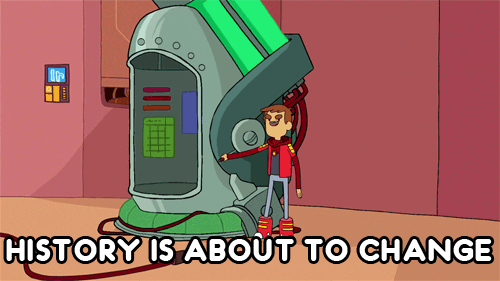
It's about time you learn how to make time go faster!
How to Make Time Go By Much Faster
-
Identify where you slump
-
Take a shower + do push-ups.
-
Eat that ‘frog’
-
Make use of Trello
-
Listen to Baroque music
-
Video game music also helps
-
Feed your mind
-
Keep a casual work setting
-
Meditate
-
Sweat it out
-
Prioritize the bigger tasks first
-
Start timing your tasks
-
Get an ergonomic chair
-
Work on tasks with no dependencies
-
Create time blocks
-
Reward yourself
-
Adopt the ‘Monday Hour One’ rule
-
Add some human interaction
-
Use the Pomodoro Technique
-
Enjoy your work
Find Where You Slump
Notice how you always start the day strong, and then your productivity takes a sharp reversal as you progress (especially after a lunch-coma)?
You should structure your day and position the mundane and less intensive tasks to the hours when you ‘slump.’
Dale Johnson of Nomad Paradise suggests, “For me, tracking the ebb and flow of your energy throughout the day and identifying where you peak and where you slump is key to always working in a state of productivity and alertness.”
Johnson continues: “In the hours you slump, which is typical for most people between 2-5 pm, try to structure your less brain-focused work. Schedule your meetings, videoconferences, and any simple admin or smaller tasks for this period. Save your more productive hours for your intense, more focused work.
I always drink water too, as not only does it keep my hydrated, the toilet breaks allow me to work in bursts with momentary breaks, rather than for prolonged periods.”

Take a Shower + Push-ups
It’s not about the time you kill spending scrubbing yourself up, but how it positively affects your mental state. Also—push-ups are great; hear us out!
Chris Cucchiara suggests: “Taking a bath or shower always seems to make minutes feel like seconds! It is also said that this slows our brain waves down to a more alpha state so we can relax more, making us sink into the moment and transcend the clock.
Also, a quick set up push-ups or sit-ups can get the good endorphins firing, making us feel more positive. And when we are more positive, time seems to go by much quicker.”
See—it’s all scientifically backed!
Eat That Frog (Not Literally)
You know that one dreadful task that’s sat at the very bottom of your backlog for days? According to our findings, you should put it at the forefront.
Elle Meager of Outdoor Happens shares: “The most important thing for me is to get the least pleasant tasks done first.
As Mark Twain said: ‘If it's your job to eat a frog, it's best to do it first thing in the morning. And if it's your job to eat two frogs, it's best to eat the biggest one first.’ When you get the ‘frogs’ out of the way during your most productive time in the morning, you can focus the rest of the day on tasks you enjoy.’
The difficult tasks get done quicker and easier when your energy levels are still up. Once your productivity levels go down as the day progresses, you’ve only got tasks left that are easy or pleasant to complete.”
Meager adds: “I work by this quote, I have it stuck to the wall right in front of me, so I never forget. It has sped up my productivity levels by at least 50%, and the day goes much faster because you’re not chugging away, procrastinating to complete that big, awful task that needs doing.”

Hamna Amjad, a Project Manager at DSRPT and a mother of two, agrees: “For the past three months, I’ve been working from home and homeschooling my kids. One tip that helps me stay sane and manage my time better is to ‘eat that frog.’
I like to finish the most important tasks first thing in the morning when my energy levels are high, and my mind is fresh. When your hardest tasks are out of the way, you can concentrate on other lesser important tasks faster. I usually spend two hours tackling them before I check my email or do other mundane tasks.”
Amjad also suggests setting boundaries, regardless of whether you’re working at the office or home: “Have set work hours and make sure you don’t work during your off-hours. Spend quality time with your family or friends. Avoid taking work calls or checking emails.”
Create a Trello Board
Trello is a popular collaboration tool that many companies use for product development. However, there’s no stopping you from creating a board that can better manage your daily personal sprints.
Rex Freiberger of Gadget Review shares: “The best way I’ve found to do this is to break my workday into blocks. In the morning (or ideally the night before), I plan out what I need to do for the day. Lately, I’ve done this on a Trello board because it’s even easier to move things around when I get to the blocking stage, but when I was keeping a productivity journal, I just did it on the page.
Once I have everything, I go through my tasks and see what can be grouped. Then I rate them based on how difficult I think they’ll be for me to achieve. I’m sharpest in the morning, so I arrange difficult tasks in that time block and easy ones during the middle of the day when my energy is beginning to flag.”
Trello has a free version for anyone to use. Here is a visualization of how the tool and working with ‘blocks.’
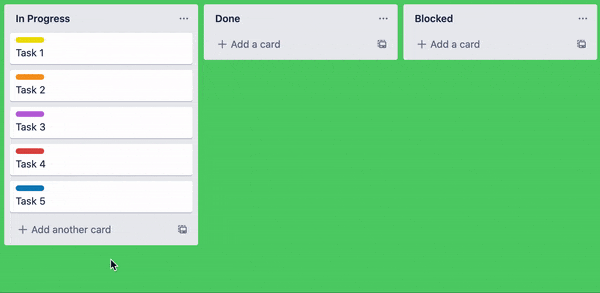
Listen to Baroque Music
Many can’t go about their days without having their headphones on. You tune in to your favorite radio station driving down the highway, have a fast-paced playlist for the gym, and maybe something more calming as you chop vegetables for dinner.
You probably have an existing playlist for work already. However, here’s how to level up your music-listening game—with a new genre of music.
Sherry Mae of Tankarium advises, “I recommend listening to baroque, classical music while performing tasks. According to a study by the American Roentgen Ray Society in 2009, the tune of baroque-style melodies profoundly affects mood, productivity, and concentration.
When professionals listen to baroque music, it helps improve mood by listening to superb tunes, which subsequently boosts productivity. Use earphones with excellent bass-producing features to maximize the experience.”
Here's an hour-long video to get you started on this genre.
If you’d like to branch out—try listening to music with no lyrics. This way, you don’t get lost humming to your favorite tracks, while focusing on your task.
An article on the different types of music that can help make time go faster and increase your productivity includes Classical, Nature, Epic, Video Game Music, and Ambient soundtracks.
Video Game Soundtracks
As stated above, video game soundtracks seem to be a go-to option for many. Greg Heilers of Jolly SEO adds:
“Start playing a soundtrack that motivates you. It doesn’t have to be music that you enjoy listening to, but it has to be music that makes you more productive. For example, put on a playlist of video game soundtracks, which are designed to keep you motivated, focused, and productive through hours of gameplay.”
If you need a starting point, my favorite track is from the fighting game series Guilty Gear, titled ‘Awe of She.’

You are what you listen to. Are you productive?
Feed Your Mind
Paul Greene, a Psychologist at the Manhattan Center for Cognitive-Behavioral Therapy, provided the following thoughts on how you can make time go faster through having an optimal work-life balance:
“Time drags when you’re working from home—especially for those who don’t love their jobs. If you’re in that situation, two things often help:
1) Feed your mind. Make sure that when you’re not working, you’re stimulating other interests. This can be reading, movies, religion, spirituality, or a hobby. Having balance in your life will help the time go faster.
2) If you’re working from home, it’s easy to let the workday bleed into the rest of your day. Try to be disciplined by maintaining a stark division between your workday and your leisure time. Having an end in sight helps us to withstand unpleasant experiences.”
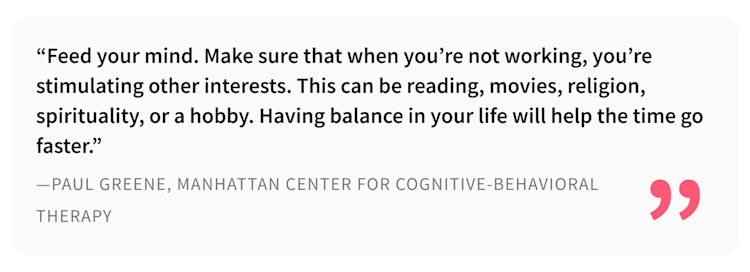
Keep Things Casual and Light-Hearted
At Smallpdf—we believe in a casual and cross-collaboration work environment. Everyone has access to other teams and resources, or whatever we need to reach our targets.
Vinay Amin of Eu Natural shares the same sentiment: “As the CEO of a supplement e-commerce company, there are times when I’m staring at the clock non-stop, and I know my staff feels the same way I encourage a non-formal and casual work environment.
My team operates remotely, so during work, I keep the mood light-hearted. I’ll often share a joke or funny GIF and encourage someone to do the same to try to one-up me. We may also use message boards to talk about common interests, such as sports. I refrain from topics that can get heated, such as politics.
To speed up time, I may ask everyone nonsensical questions, such as what they’re having for lunch and have them take a picture of their meal. We may have a vote of what they think looks the tastiest or least appetizing. Benign and somewhat ridiculous stuff of this nature disrupts the often-repetitive grind. Participation is always optional.”
Meditate
Joyce West, a career coach, suggests meditation as a medium for getting time float by more quickly:
“To me, focus = productivity. We get very unproductive and take more time to do things when unfocused, and our minds are scattered. Start the day with meditation. I am in a mindfulness meditation teacher training program now, so meditate quite a lot. Even when you take 10-20 minutes to meditate, your mind is way more focused.”
An article from Entrepreneur magazine suggests that meditating can help to reduce stress, enhance your productivity, and improve your self-awareness. It states, “When one is mentally strained, the stress hormone Cortisol releases inflammation-promoting chemicals known as cytokines. These, in turn, disrupt sleep and promote depression, anxiety, fluctuating blood pressure, and cloudy thinking.
Meditation helps regulate sleep, controlling the cortisol hormone, and promoting the release of happy hormones like endorphins, dopamine, and serotonin. This, in turn, helps (employees) be stress-free, which allows them to be highly productive, as well!”
Sweat It Out
Our next tip will get you sweating (a bit) throughout your workday.
Jay Wang of Amazing Beauty Hair adds: “One great tip is to exercise whenever you feel lethargic. Exercising helps increase oxygen levels in your body and makes your mind clear and alert. A rigorous exercise is unnecessary because simple cardio workouts also do wonders compared to not exercising at all.
Whenever you feel unproductive during work-time, a quick one-minute jumping jacks does the trick. After all, exercising helps keep the mind awake with all the oxygen-rich blood flowing into your brain, making you more productive.”

Prioritize the Biggest Task First
We’d mentioned the need to get tedious tasks out of the way. However, you could also try to speed time up as you go the other way; by accomplishing the most important tasks when you are at the peak of your productivity.
Dave Bowden of Irreverent Gent adds: “My number one piece of advice for both being more productive and making time go faster is to tackle your biggest or most intimidating task first.
Most people are sharpest in the morning (often after a coffee, for many of us), so no matter what time you begin your workday, start by working on the task or project that’s most time-consuming, energy-draining or important.
Tackling your big project first has two major benefits. First, it helps you build momentum. Once you’ve tackled your biggest or most challenging project, everything else seems relatively easy by comparison.
Second, it makes time go by faster because once you start in on your big project, you’ll likely find yourself so immersed in it that you won’t notice how much time goes by. This is particularly true in the mornings when you’re sharpest. It’s easier to focus intensely on one thing at a time, rather than getting distracted by emails, social media, or the dozen other things on your to-do list.”
Start Timing Your Tasks
One mistake many people make is to let work bleed into the rest of your day. In turn, your 9-to-5 becomes a 9-to-all-nighter.
To prevent burnout, Neil Roach of Boxroom Office shares: “The best way to speed up your workday is to put timings around the tasks you’re working on. If you don’t, you’ll very quickly fall prey to Parkinson’s Law, working 12 hours per day instead of 8.
Some gurus will say you’re crushing it, but you’re really just barreling down the self-destructive highway to burnout and depression.
So, if you want to have a more productive day (that also goes faster), here’s one way to approach it: First, get your social media stuff out of the way before you finish your morning coffee, tea, or juice. Then, stop yourself from going to social media by using something like the Freedom app—it blocks your Internet access to these sites by default.”

Invest in an Ergonomic Chair
Comfort is key to a practical workstation. Google recently announced a $1,000 allowance for its employees to spend on setting up a comfortable work environment as they work from home.
One common but crucial component is to have a comfortable seating situation.
Jeremy Owens of Seriously Smoked explains: “Work-from-home professionals should purchase ergonomic chairs and equipment to increase productivity. One excruciating experience in working from home is using a non-ergonomic chair, tables, and other tools that help promote body soreness while working.
When professionals work with a sore body, it helps create a feeling that time goes by slow. Additionally, an aching body distracts the mind from focusing on tasks.”

Stop Waiting + Non-Dependencies
Time feels like it’s at a standstill when you have to wait.
Liz Sumner, a productive life coach, comments: “Time goes especially slowly for me when I’m waiting for a response. For example, I want to make the travel plans but need to know essential details like date and location. Or I want to pull a budget together, but I’m waiting for estimates on a critical piece. If my energy is focused on one thing, but I need someone’s answer before moving forward, I can get frustrated and impatient, continually checking messages to no avail.”
Instead, Summer suggests reviewing non-dependencies—things that you can accomplish on your own—and work on sorting them out. She adds, “One option to make time pass is to review the project for non-dependent aspects that can be moved forward. Sometimes it might make sense to explore other options in the meantime—create a Plan B in case the awaited response is not favorable.
Odds are, just as you’ve fully engaged with the new focus, your phone will beep with that response you’ve been waiting for.”
Create Time Blocks + Use a Calendar
One of the most obvious steps to planning a more productive day (and making use of your time) is to create a to-do list. However, many fall short as they do not take the time required for each task into account.
One solution would be to divide your day into sections. Alexis Haselberger advises: “Use your calendar to time block your day. You’ll feel like time is going faster if you have milestones that you are hitting along the way. Every time you finish a work block, you’ll get a little dopamine hit that will help you keep moving forward. When you separate the planning from doing in this way, you also need less activation energy to get going.”
Google Calendar
Our favorite tool for scheduling meetings is Google Calendar: You can quickly create, organize, and schedule in-person or remote sessions.
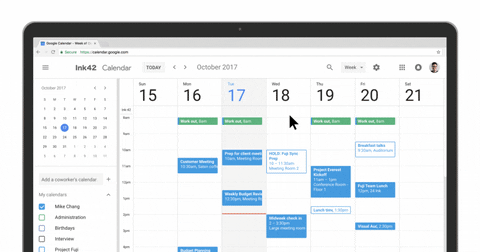
Reward Yourself
You’re prone to burnout if you continuously work without taking a break. Dr. Paul Symonds suggests creating a space where you can take time off to treat yourself—to your preference.
He adds: “Using a reward system, I find it’s possible to make working from home far more productive and fun time-wise. Think about what small things you can offer to yourself as a reward once, twice, or three times in a day that will make your day move fun and keep your body and mind positive (without including food as a reward) more positive.
After finishing a specific task within a particular timeframe, you could reward yourself with 30 minutes to sit and read a book for pleasure-reading afterward.”
The Monday Hour One Rule
The first hour of your first day of the workweek shouldn’t be spent hustling to catch up on your task. Instead, use it wisely to map out the rest of your week.
Felicia Broccolo of The Life Coach School suggests: “The secret to getting more done in your week lies within the first hour. When you dedicate that first hour on Monday morning to set up your calendar for the week ahead, you’ll be amazed at how much more structured and productive your workdays become. You’ll get more done in a 40-hour workweek than most people do in a month, even during a global pandemic.
By utilizing a time management strategy called Monday Hour One, you’ll learn the importance of emptying your brain and getting your entire to-do list out on paper. It may feel silly to write down every single thing you have to do or get done that week (really, everything, including shopping for groceries, making appointments, writing an email, etc.), but this strategy works.
Once you can see everything on paper, you can decide how long you’re going to dedicate to each task and add them to your calendar. This can make an enormous difference in your level of productivity.”
Add Some Human Interaction
For those working from home—don’t be afraid to reach out to your colleagues for friends (during your break).
Dana Humphrey of Whitegate PR, who has worked from home since 2008, suggests: “Human interaction is important, so reach out with zoom calls, etc. for meals and when you feel sad. Getting out with your coffee (even if you sit on your curb by yourself for a few minutes), a walk or a morning workout can help. Get a Routine going and stick to a schedule. Pick meal times, so you aren’t enticed to snack all day.”
The Pomodoro Technique
One very prominent time-management method is the Pomodoro Technique.
It involves starting a task, going at it for 25 minutes, take a short break of 3-5 minutes, and then repeat. After four rounds, go for a longer break, of 15-30 minutes. And finally, repeat.
Dan Bailey of Wikilawn suggested a spin on the method—which has helped him to speed up his time throughout the day: “[B]ut if I really want the day to pass quickly, I like setting the work time to 15 minutes intervals. So I do 4 of these every hour, with 5 minutes breaks in between. This lets me move from task to task quickly if I need to, and it happens in such short chunks of time that the day flies by.
Enjoy Your Work
This one is a no brainer. “Your brain is the key, reign the time that’s likely to flee. If your brain enjoys a thing, it’ll ignore the perception of time. Otherwise, it’ll check the tick-tock again and again hoping to end your boring schedules,” says Masum Billah.
He tips: “It won’t be helpful if you’re always dipped into the movies or novels.
Sooner or later, you’ll run short of oil in your engine. It’s true as you’ll start to wonder, Oh, I was a movie lover, but now I’m feeling bored! So if you want to watch or read or do your favorite things, set a goal! I’ll recommend you to watch a movie as you’ll feel the urge to continue this.
If you like to read books, make a challenge to finish all the Robert Langdon or Harry Potter books. It’ll definitely keep the urge to read more. If you like writing like mine, set an aim to use your skill in more fruitful and prosperous ways. Remember, these quarantine days also count as seconds and hours. So spend the time with fun and functionality. Time does fly when we’re having fun and obsessed with our passion. Hopefully, it’ll help you to hack the time in beautiful memories.”
And there you have it. Don’t wait until the start of the week to initiate your newly learned time-skipping techniques. Get started!
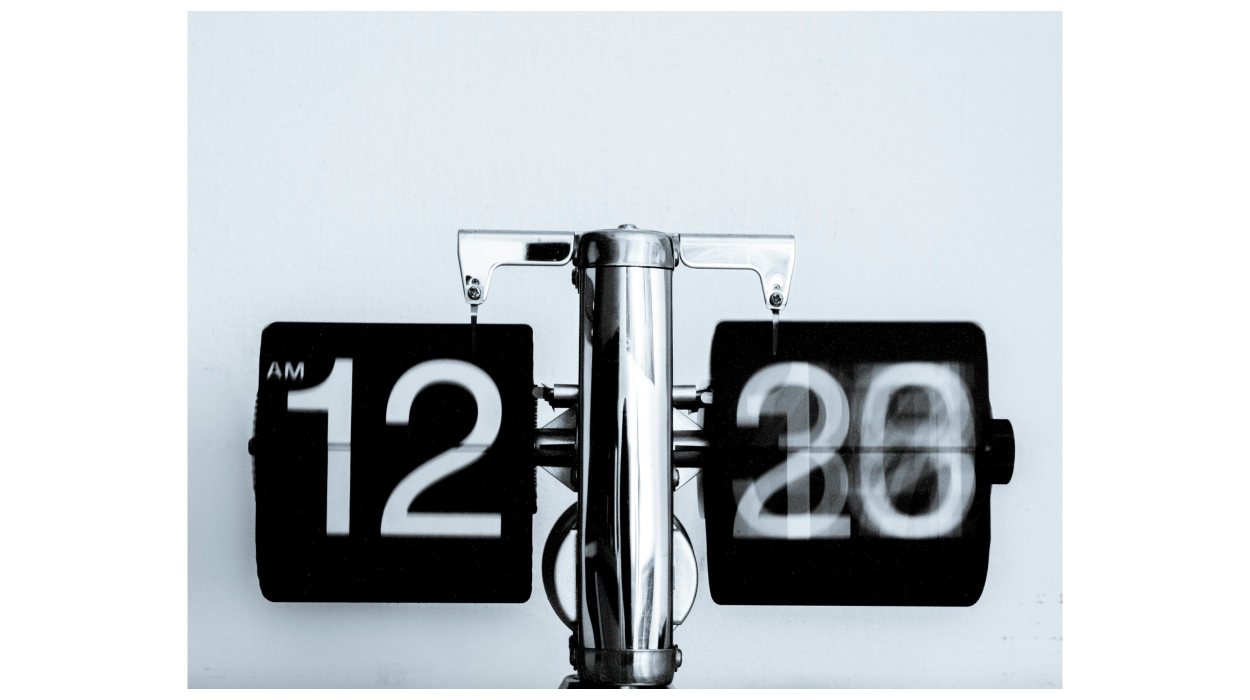
Ready to make time skip?



